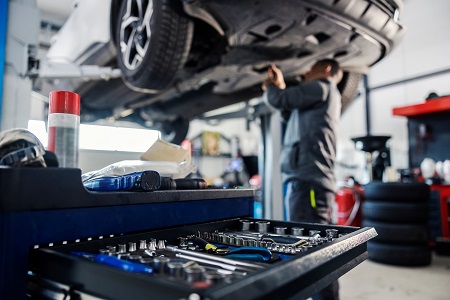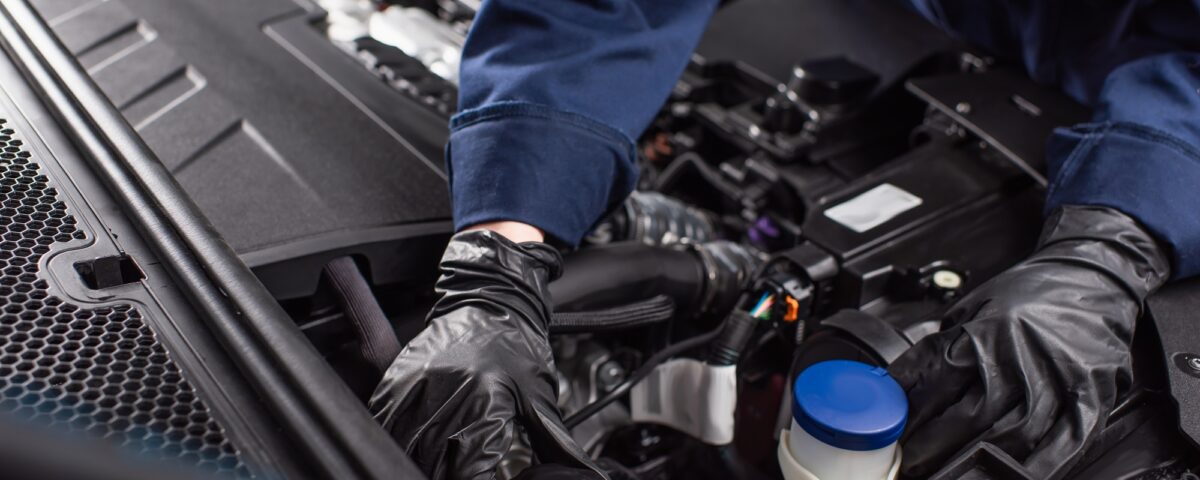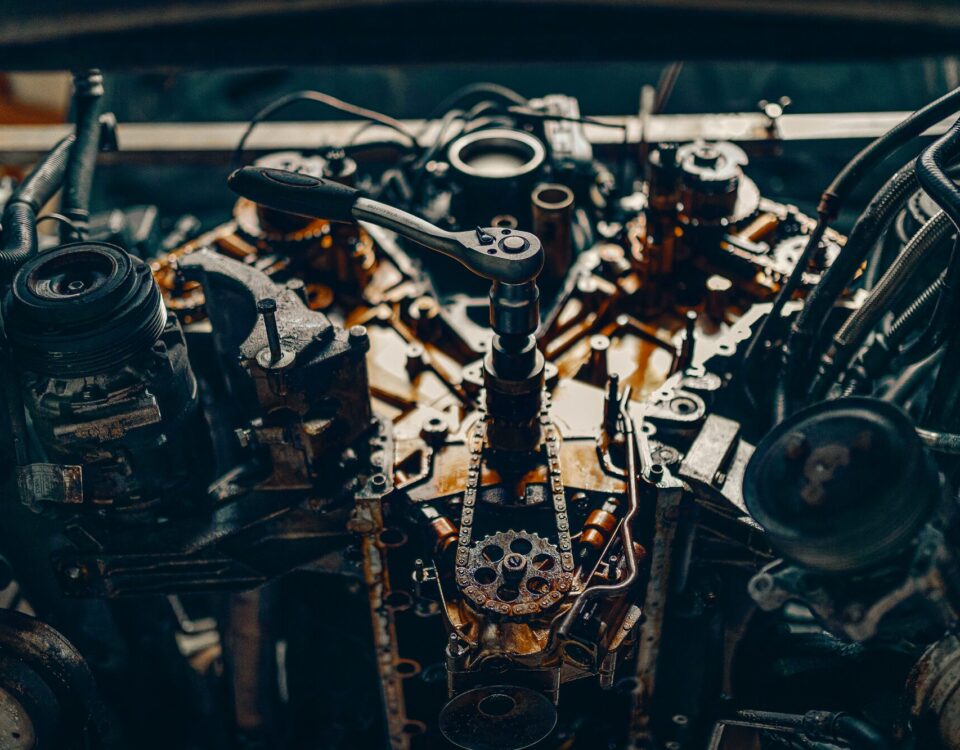7 Signs Your Vehicle Needs a Check-Up
September 21, 2020
What Should I Look for In an Auto Repair Shop?
November 17, 2021Proper car maintenance saves you time, money, and extends your car’s lifespan. Regularly inspect tires for optimal performance and safety. Keep an eye on oil levels for engine lubrication and change it if it’s darker. Maintain fluid levels to prevent overheating and ensure clear visibility and handling. Inspect your brakes and replace them if they’re worn down. Check your belts for signs of damage and change air filters and spark plugs at specified intervals. Don’t ignore warning lights, as they can signal potential problems. Dive deeper to gain comprehensive insights into these essential maintenance tasks.
Inspect and Maintain Tires
Keeping a close eye on your tires, you can enhance your car’s performance and fuel efficiency by regularly checking tire pressure and ensuring it’s at the optimum level. This simple yet crucial task can improve your gas mileage, reduce your carbon footprint, and save you money at the pump.
Don’t overlook the importance of tire rotation at recommended intervals. This encourages even tread wear, extending the life of your tires and ensuring safe driving on all road conditions. Inspecting for tire damage is equally crucial. Look for cuts, bulges, or any other irregularities that could lead to a blowout or accident. Remember, maintaining your tires isn’t just about performance and economy, it’s a matter of safety too.
Check Your Oil
Just as tire maintenance can greatly improve your vehicle’s performance, regular oil checks are equally pivotal in ensuring your engine runs smoothly. Make it a habit to check your oil using the dipstick; monitoring for the correct level is crucial for optimal engine lubrication. If the oil falls below the recommended mark, it’s critical to top up to prevent potential engine damage.
The oil’s color is a reliable indicator of its condition. If you notice a darker or dirtier hue, it’s time to change your oil. Heeding your manufacturer’s guidelines for oil change intervals is essential to maintaining engine health. Understanding and managing your car’s oil needs not only saves you from hefty repair bills but also enhances your vehicle’s overall performance.
Check All Fluid Levels
Beyond oil, it’s crucial to keep an eye on your car’s transmission fluid, washer fluid, power steering fluid, and coolant levels, ensuring they align with your manufacturer’s recommended levels. Regularly checking these fluid levels can prevent potential issues.
For instance, maintaining proper coolant levels wards off engine overheating and possible damage. Your washer fluid is pivotal for clear visibility on the road, so don’t neglect this simple check. Power steering fluid, on the other hand, is key for smooth and safe driving maneuvers.
Each of these fluids plays a unique role in your vehicle’s operation and safety. By routinely monitoring and maintaining these fluid levels, you’re taking an essential step towards optimal vehicle performance and longevity.
Check the Brakes
After ensuring your car’s various fluid levels are up to par, it’s time to turn your attention to the brakes. Start by inspecting the brake pads. If they’re less than 1/4 inch thick, it’s time for replacements.
Next, check the brake rotors for any scoring or warping that could affect your braking performance. Now, make sure the brake fluid level is satisfactory and the color isn’t dirty, which might indicate issues.
Listen for any unusual noises when applying the brakes – grinding or squealing isn’t normal. If you find any problems or are unsure, get a knowledgeable mechanic to perform a brake inspection.
Annual checks by professionals help ensure your brake system remains in peak condition.
Check the Belts
Turn your attention now to the belts, a crucial component of your car’s engine which, if not properly maintained, can lead to costly repairs and potential breakdowns. Inspect the timing belt every 60,000 miles and the serpentine belt every 40,000 miles. Look for signs of wear, including cracks or fraying. These are indicators that it’s time to replace the belts.
Don’t overlook their importance; a malfunctioning belt can cause significant engine damage. Adhere to the manufacturer’s recommended replacement schedule to avoid this. Regular maintenance services for your belts not only prevent unexpected breakdowns but also ensure smooth engine performance. So, it’s worth your time to maintain them properly, as this simple task could save you a heap of trouble down the road.
Pay Attention to Warning Lights
While you’re diligently maintaining your car’s belts, don’t forget to give due attention to the warning lights on your dashboard, as they’re your vehicle’s way of signaling potential problems.
These lights are more than just colorful distractions; they’re indicators of potential issues that could lead to major repairs and safety hazards if ignored. From engine alerts to brake warnings, each light corresponds to a specific system within your car.
By promptly addressing these signals, you can prevent further damage, saving yourself from costly fixes down the line. Remember, your dashboard isn’t just for aesthetics; it’s a vital communication tool between you and your vehicle.
Change the Air Filter and Spark Plugs
Maintaining your car’s performance goes beyond addressing dashboard warning lights; it’s equally crucial to routinely change your air filter and spark plugs.
Your air filter should be replaced every 15,000 miles; this ensures optimal airflow, protects your engine from debris and can improve your gas mileage by up to 10%. Similarly, spark plugs need changing every 30,000 miles. Efficient combustion hinges on this preventative maintenance, improving fuel efficiency and preventing engine misfires. Neglecting spark plugs can decrease fuel efficiency by up to 30% and cause engine performance issues.
Regularly servicing these parts is integral to your engine’s longevity and overall vehicle performance. By performing these tasks, you’ll uphold your car’s health, saving you both time and money.
How Can Steve’s Imports Help You?

You might wonder where to turn for help with all of these maintenance tasks; look no further than Steve’s Imports. Our auto repair shop offers reliable vehicle maintenance and guarantees quality in every auto repair service.
When your check engine light illuminates, it’s time to visit Steve’s. Our expert technicians have the tools and knowledge to diagnose and fix the issue, saving you money on car repairs in the long run. We understand your unique needs and expectations, providing options that fit your budget without compromising safety.
Follow these routine maintenance tips from Steve’s Imports and become more self-reliant while protecting your vehicle investment.
Contact us today for excellent customer service.
High-quality repair services we provide:
- Brake Repair
- Engine Repairs
- Clutch Repair
- Transmission Repair
- Cooling System Repair
- Timing Chain Repairs
- Oil Leak Repairs
- Suspension Repair
- And More
Visit our About Us page for more information about our dependable auto repair shop.


